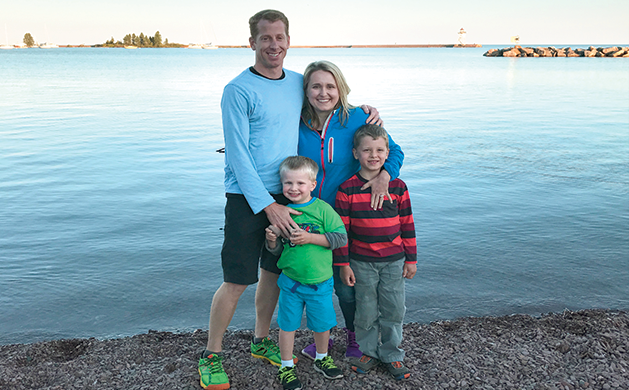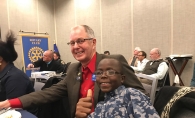
After trying track and field in middle school, Levi Severson never stopped running. He continued the sport in high school and participated in cross-country along with track and field during his entire college career at the University of St. Thomas. He went on to serve eight years of active duty as an officer in the Air Force, running on the all Air Force marathon and cross-country teams. Today, Severson shows no sign of slowing down. “Running for me has evolved into my daily meditation,” he says.
Severson is an Edina resident and director of strategic sourcing for Lifetime Fitness. He is also nothing short of dedicated, averaging five to 10 races and one to two marathons each year. He’s participated in the City of Lakes and Lake Minnetonka Half Marathons numerous times, along with 5Ks and 10Ks. Running in the Twin Cities Marathon for six years, Severson has finished first among participating Edina runners for the past three years.
He runs between 30 and 45 miles a week in the offseason, and 50 to 60 miles in preparation for a marathon.
Outside of Minnesota, he’s run in Chicago and in the Boston Marathon. In the Air Force, Severson represented the U.S. in the Military World Games. He also competed in the international Italian race in Modena, Italy, representing the U.S. on an all-military team.
“He’s always at the bigger races, and always does well,” says Lance Elliott, an accomplished Masters runner and friend of Severson.
Severson’s impressive performances are a testament to his hard work. He runs between 30 and 45 miles a week in the offseason, and 50 to 60 miles in preparation for a marathon.
Depending on the time of year, his training regimen consists of running four to six days a week. One day is for cycling or swimming. “I [also] do strength work, two or three days a week of light calisthenics,” Severson says. The exercises also help prevent injury, which many runners get. Severson has dealt with traditional runner injuries including Iliotibial Band (IT Band) Syndrome, an overuse of connective tissue running from the outside of the hip to the shinbone, making leg movement painful.
While lengthy training is advantageous for races and marathons, its time consumption can be a challenge for Severson. He makes sure to not let training impact family life too much, by running early in the morning before work, during his lunch hour or sometimes both. “My wife Jennifer is a great supporter of my running hobby. We are blessed with two great boys (7 and 4) who sometimes join me for a run on their bikes,” Severson says.
His perspective on running has changed over the years, especially since having a family. As an undergraduate, Severson’s goals revolved around competing the best to ensure team success. In later years, running became partly about establishing friendships while embracing the thrill of competition.
Severson’s goals shifted again after having children. “[When] my first son was born, [running] changed from trying to get faster to, it’s just part of my life now, and I want to enjoy it. I want to maintain a certain fitness and competition level, but within the balance of my family,” he says.
Severson will keep running as long as he can. For him, running is his outlet, his passion, a routine so ingrained he doesn’t feel quite right without it. As for upcoming athletic events, Severson looks forward to trying something new. “I did my first duathlon this last year, I might do a triathlon in the future for fun,” he says. Consistent with running as always, Severson continues his 25-year running streak









